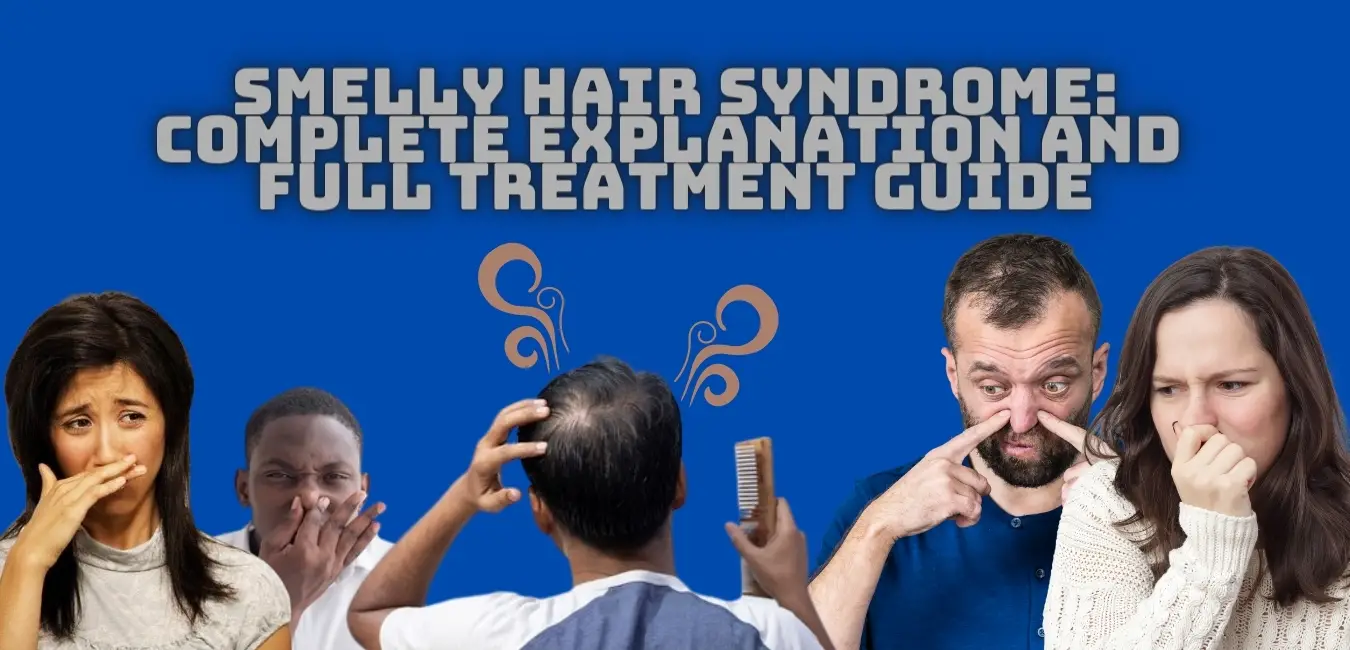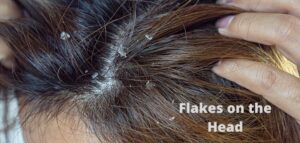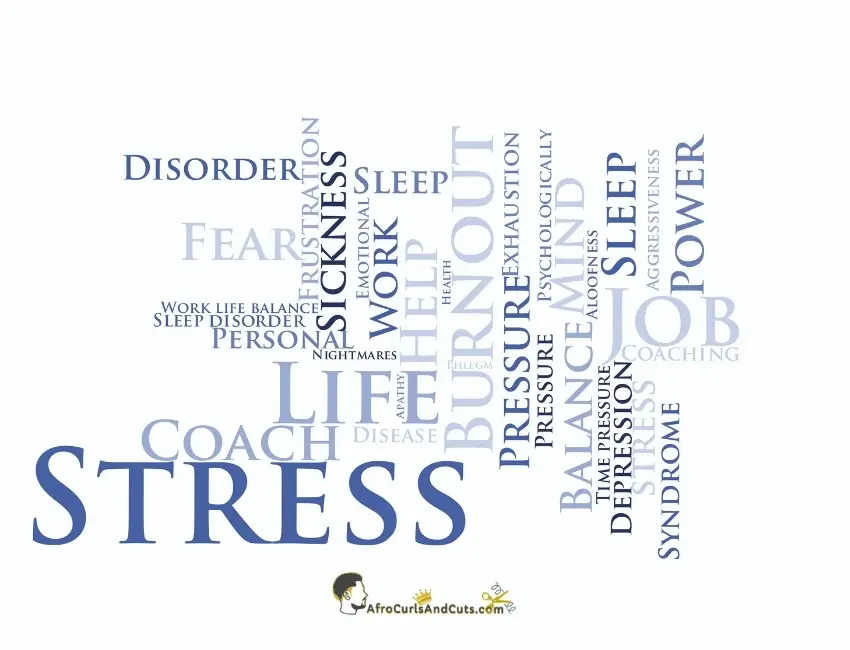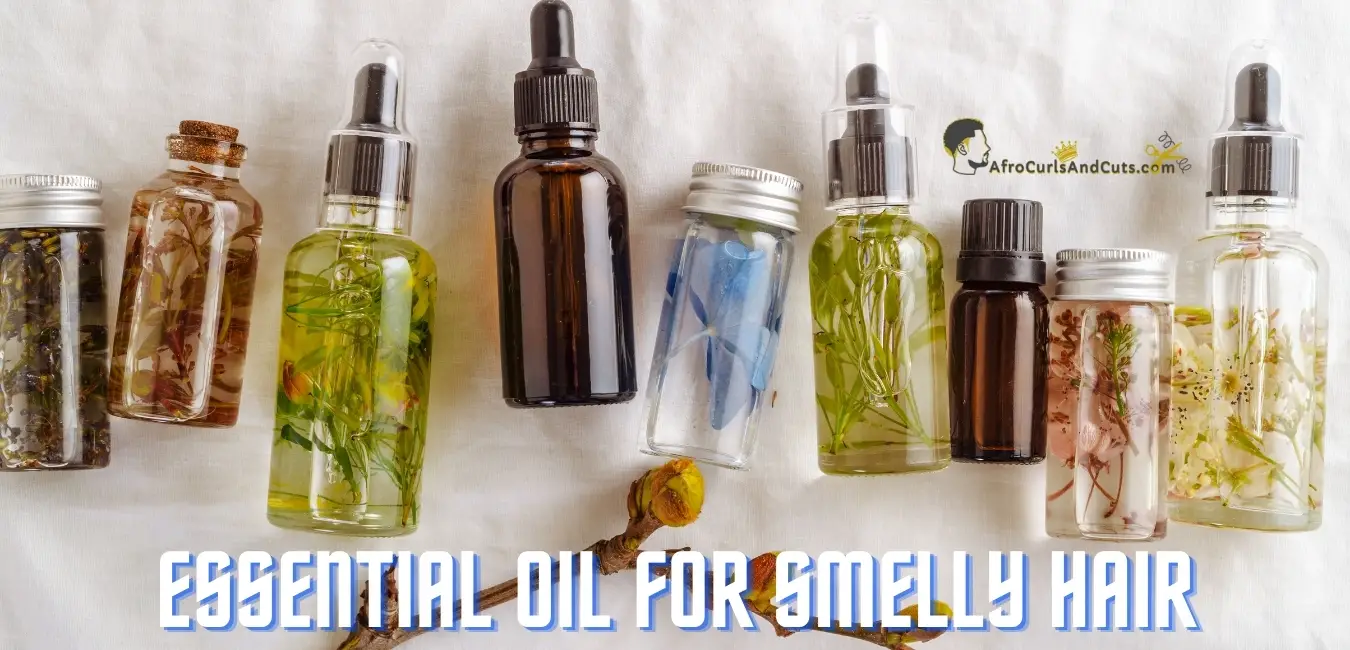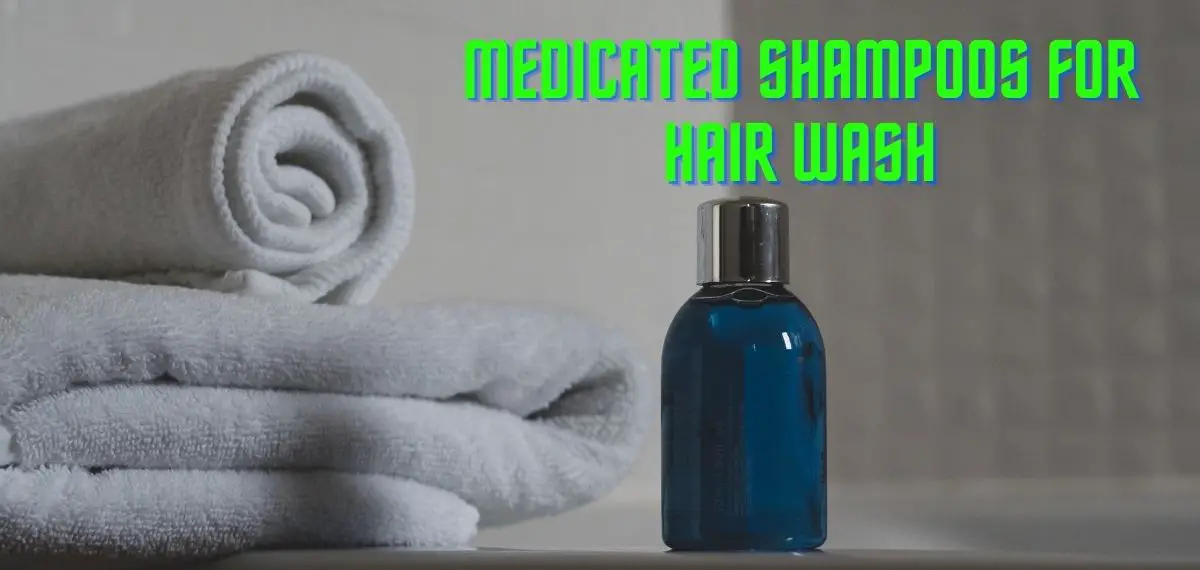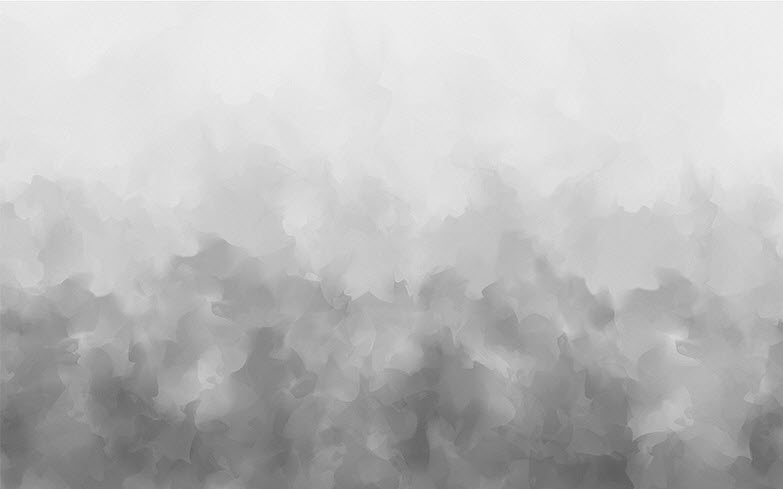We may earn money or products from the companies mentioned in this post.
Smelly hair syndrome: complete explanation and treatment guide
Are you dealing with smelly hair syndrome? It’s embarrassing when your hair smells bad, especially if you’re out in public.
Did you know that smelly scalp syndrome is actually due to bacterial or fungal growth on your scalp? This means that the awful smell will not just disappear on its own. The best defense against hair odor is either organic remedies and or prescribed treatments from a doctor.
I am here to help; that’s why I wrote this article for people who suffer from smelly hair syndrome to learn about their condition. In addition, you’ll find the root of the problem and ways of dealing with the situation at home or simply going to the doctor.
The embarrassment of smelly scalp and hair
Smelly hair syndrome is not something people like to discuss. Even people who have it are reluctant to share their condition. They feel embarrassed or ashamed that they can’t be as confident as others when it comes to the way their hair smells. I’m here today with a message of hope for you. If you suffer from smelly hair syndrome, there are solutions to get rid of the foul smell!
What Is Smelly Hair Syndrome?
The smelly scalp syndrome is best describes as a disorder of a foul smell coming from your head. The unpleasant odors can come from poor hygiene, excessive sweating, or bacteria breaking down natural oils on your scalp.
Note, smelly head syndrome condition that affects millions of people across the globe. The growth of head fungi affects both men and women of all ages; however, it is most common in children between the ages of 2 to 13 years old.
The condition may even appear from wearing head covers while the hair is wet, which traps moisture. Furthermore, other factors contribute to the scalp with a foul odor. I will go into further detail later in the article.
Symptoms of Smelly Hair syndrome
You may be wondering what the smelly scalp symptoms are? Well, the symptoms are pretty easy to spot. Here are some signs to look out for when dealing with smelly scalp syndrome:
Smells Bad
The most common sign of smelly head syndrome is unpleasant-smelling hair. The pungent odor of scalp sweat compares to the smell of sour milk, mold, or dirty socks. The undesirable smell tends to be strong enough that others will notice right away, making people avoid you.
Flakes on the Head
Another symptom of smelly infections is a flaky scalp; the flakes are usually gray or white. The coloring of the head flakes is an indication that it is different from dandruff. Dandruff is a symptom of scalp dryness, which you can quickly eliminate with the right shampoo. I should also mention other than the coloring; dandruff does not emit any foul scent.
The smelly hair syndrome is more severe than scalp dryness as it may also create nasty gunk on the scalp. For that reason, you need a specialized shampoo to eliminate smelly head syndrome.
Itchy Scalp
People with a lousy scalp odor also experience a very itchy head, which causes them to scratch often. It may affect your hair follicles and even cause permanent hair loss in some cases. In the worst case, severe scratching can lead to scarring alopecia. Yikes!
Head Irritation and Pain
Some smelly scalp sufferers experience irritation of the head with red patches that are sore to the touch. The smelly head syndrome is the result of an immune system response to the head fungus. The immunity response causes inflammation and triggers pain which makes it feel like your head is on fire.
Note that the horrific odor emanates from the scalp, and hair is just one of the long list symptoms. Hence the reason why stinky scalp is such a big problem for those who suffer from it. Smelly scalp and hair can have a devastating effect on self-esteem, causing people to feel embarrassed in public.
If you are suffering from smelly hair syndrome, I recommend finding out the root cause of the smelly head problem! Finding the root will help prevent smelly scalp and hair as well as help treat the fungal infection.
Do you have Smelly Hair Syndrome?
This sticky hair syndrome often leaves one acutely embarrassed and struggling to determine why the disease affects them. Most people suffering from the unpleasant head odor say the smell decreases when they wash regularly but never goes away entirely.
Keep in mind that some people are not always aware of head fungus for many reasons. For example, being numb to the smell poses a problem leaving the infected unaware of the stanch. What do you need to know about scalp fungus?
If you were to ask the typical person on the street, “Do you have scalp fungus?”; Most would say no and may even be offended! Let me tell you, we all have fungus on our heads. Some have more severe cases than others.
Fungus is vital for breaking down sweat and oils in the scalp. However, fungus on your scalp spread faster when you have more nutrients. Often because the pores close, there’s an excess of sweating or an increase in oil production from your head. The combination can lead to a scalp infection that results in a horrible smell from your head.
Besides the unpleasant smells, one significant indicator of microbial scalp infections is buildup because of overactive sebaceous glands. Think about it this way; scalp fungus feeds on scalp oils and even dead scalp cells to proliferate.
The scalp is one part of the body that’s continuously exposed to bacteria, dust, and other pollutants from our everyday surroundings. In effect, making it more prone to scalp infections than the skin found in other parts of your body.
What Does smelly scalp smell like?
When dealing with smelly scalp fungus, many complain about the odor. The pungent stench of the scalp affects the individual who’s suffering from it and people who are nearby. Note, smelly hair that comes from smelly heads may feel, look, and smells disgusting.
The smell varies, but people suffering from the condition describe the scent as smelling sour milk, dirty socks, fish, or stinky diapers. Some even say their hair smells like mildew or a wet dog.
Most people will smell the foul odor coming from the person’s head when they have a scalp infection. Others who smell the hair stench describe it as smelling like sulfur, while others have said that it smells like rotten eggs! In either case, it is unpleasant and smelly!
Why does my scalp smell after 1 day?
You may be wondering how long does scalp odor lasts? Once the condition is under control and you fix your smelly hair syndrome, the smell should not come back as long as you wash regularly.
However, if the condition is due to hormones imbalances or sweat glands deficiency, the smell will last much longer. In this case, you’ll need to visit a doctor or dermatologist for a proper diagnosis. An experienced health professional will be able to help fix your smelly hair syndrome.
What Causes Smelly Hair And Scalp?
Although there can be several reasons behind smelly hair, all of them have one thing in common: scalp buildup.
The buildup of grime, dry skin cells, dandruff, hair product residue, and pollutants on the scalp can cause a significant smell.
Bacteria on your scalp thrive in an environment of sweat and oil, which leads to the proliferation of microbes. These impurities provide food for the microorganisms that live on the scalp and the spread of scalp fungus.
Fortunately, smelly hair syndrome is not something to worry about because you can easily treat smelly hair syndrome with simple home remedies and medical treatments. Have no worries; we’ll discuss various treatment options in this article.
I mentioned smelly hair syndrome derives from bacterial or fungal growth on your scalp. Everyone has these microbes, and the problem is when there’s an overgrowth of head fungus and bacteria. When the microbes are left untreated for prolonged periods is when muggy smell occurs.
According to specialists, the rotten smell occurs due to microorganisms creating oil buildup, which affects your pore’s breathability.
Here’s what happens: The bacteria on the scalp secretes proteins and toxins responsible for scalp odor. These scalp microorganisms multiply quickly and feed off the scalp dead skin and oil produced by oil glands.
Let’s go over some of the other factors that lead to unpleasant smell from your scalp:
Your eating habits
A person’s diet is usually a significant factor in scalp odor. What you eat can affect how your scalp secretes oils, which can determine the way you smell to others. For example:
The way certain foods are metabolized by your body (particularly by the liver) might cause abnormal scalp secretion of pheromones, causing head odor. Foods high in sulfur can interfere with the scalp’s ability to cleanse itself of toxins and excessive scalp oils.
Foods high in protein, especially meat products, can cause scalp odor. Some scientists have speculated that carnivores produce a strong body odor due to their bodies processing large amounts of protein.
The higher sulfur content found most often in meat causes an increased odor that’s resolved by taking a sulfur-bind supplement.
Stress and hormonal changes
Both men and women experience stress and hormonal changes at some point in their lives. Think about it, when you hit puberty, you go through significant changes in both your body and mind. And do not forget the constant stress of school, career choice, or selection of a life partner.
Note, chronic stress and hormonal changes often lead to sebum overproduction, leading to seborrheic dermatitis on the scalp. Often high levels of stress may even lead to hormonal Imbalances that cause seborrheic dermatitis symptoms on other parts of the body, such as the face, back, and chest.
Similarly, when women become pregnant or going through menopause, they may face hormonal imbalances that aggravate seborrheic dermatitis of the scalp. During menopause, sebaceous glands on your body start producing lesser sebum. Still, there are no exceptions for sebaceous glands in your head!
Excess sebum production is triggered by external factors like a stressful lifestyle or an improper diet.
Environmental Pollution
Air pollution is primarily invisible to the human eye and can only be smelt or felt. Despite this invisibility, various pollutants in the air can still get trapped in your scalp oils and sebum emitting pungent smells.
The scalp smells are caused by microbial scalp infections that feed on pollution, and dead skin cells tend to foul. When dealing with pollution, the best line of defense is hair wash and the use of a high-quality hair conditioner.
It’s important to note that hair wash removes dead skin cells that the microorganisms thrive from, reducing bad scalp smell.
Remember, frequent hair washing is vital in reducing smelly hair; however, be careful not to over-wash as it will result in dry hair and breakage.
Chemical Hair Products
Whether you know it or not, all hair products aren’t created equally and could lead to your hair having bad odor. Hair products with harmful chemicals found in them can cause scalp pH changes that cause dead skin cells to build up on your scalp and hair.
Even hair products that are marked “safe for daily use” can cause harmful side effects. A good rule of thumb is to monitor how the product affects you once you apply it to your hair. Doing so will help you reduce complications later on.
When using hair products, your hair care regimen should not only offer a pleasant smell but also treat dandruff, scalp itch, and oily skin.
Avoid a hair care routine that aggravates microscopic breeding grounds or amplify excessive sweating on the scalp.
Remember, scalp odour from hair products can be a direct result of an allergic reaction. If you are experiencing odor because of an allergic infection, stop using the product immediately and consult with a health physician.
Bad And Unhygienic Hair Habits
Oily scalp, dead skin shedding, and dirt can all lead to your hair smelling terrible. These are the leading causes that generally contribute to bad hair health.
Taking into consideration that poor grooming and bad hygiene are the primary causes of funky scalp. We must discuss some of the bad hair habits that lead to your hair starting to develop a strange foul smell.
A few such bad and unhygienic hair habits you need to avoid:
Poor grooming habits
Poor grooming practices like not combing or regular hair brushing stimulate hair follicles and remove dirt and dead cells. Good grooming habits help keep your hair and scalp healthy.
When the scalp properly is not groomed, the hair may become oily and start developing a nasty smell. The bad scalp smell in combination with sweaty hair can be quite a turn-off to most people.
Poor hygienic hair care
Without proper shampoo habits could be devastating to how your hair smells if you’re experiencing hormonal imbalance. Hair and scalp should routinely be washed with anti-dandruff shampoo or degreasing shampoos to reduce oil production created by the sebaceous gland.
Poor hygiene practice can create a buildup of dirt, hair product residues, and microorganisms on your hair. This can lead to an overgrowth of yeast fungus, resulting in dandruff, scalp acne, and smelly hair.
With that said, it is wise to wash your hair with either gentle shampoo, and for the worst case of smelly hair, consider medicated shampoos.
Overactive sweat glands
Hair and scalp smell can be from a condition called hyperhidrosis known, otherwise as excessive sweating. When individuals suffer from overactive sweat glands, they cannot control when and how much they sweat.
The hair and scalp can become a source of embarrassment for these individuals because their head smells sour. It is challenging to prevent smelly scalp and hair when dealing with hyperactive sweat glands. You will need to consult with a doctor as they’ll prescribe medicine for excessive sweating.
How do I prevent smelly hair?
Smelly hair prevention is the key to healthy hair while also avoiding odors. The first step is to identify and treat the cause of smelly hair, which varies from person to person. The second step is to cure hair follicle infections with hair odor eliminator treatments.
Find what triggers hair odor for you and avoid them:
Some people develop hair odor due to excessive sweating, which occurs in hair follicle infections. While others develop hair odor due to wearing a hat or scarf while the hair is still wet… becoming a breeding ground for microbes. Though they are two different examples, both can make your hair smell bad.
Another way to prevent a smelly head is to avoid scratching your scalp. It leads to an accelerated shedding of dead cells, which increases the risk of infection. Scratching your hair also damages hair roots and could lead to scarring alopecia.
Lastly, be sure to wash your scalp and hair after workouts thoroughly. Your hair regularly should be wash to help prevent sweat buildup on your scalp, relieving the discomfort caused by prolonged perspiration.
How do you get rid of smelly scalp?
There are many ways you get rid of stinky hair, both with home remedies or medical treatments. Keep in mind some may work while others may not. You’ll have to try each or even mix and match to find which works best for you.
Effective Ways To Get Rid Of Smelly Scalp And Hair
Here are some of the best ways to fix smelly hair and scalp:
Home remedies
As we know, when your hair grows without proper care, it will become oily and smelly. This condition is referred to as smelly hair syndrome or scalp odor. The good news is that many natural home remedies may help you get rid of the problem. Best of all, you can find most of the items in your kitchen!
Let’s go over some of the home remedies for smelly scalp syndrome:
lemon juice to treat smelly scalp syndrome
One popular remedy for foul scalp odor is using lemon juice as a pre-shampoo before washing and rinsing off with warm water. To use this remedy, all you need to do is apply the lemon juice directly onto your scalp as a pre-shampoo treatment.
Leave it on for a few minutes so that the lemon penetrates the hair follicles and skin before washing with a mild shampoo.
Lemon or lime juice can also be helpful when you add a few drops in unscented oil. You can then apply it to a smelly dry scalp, and it will help your hair smell better and kill the troublesome bacterias.
Baking soda
Baking powder, which is used in cooking, cleaning, and more, may help with hair odor. It can eliminate bad smells from hair and exfoliate the scalp of dead skin, dirt, and oil.
Baking soda is a hair odor eliminator that may be an effective solution to hair that smells bad.
If you’re dealing with smelly hair syndrome, try these easy steps at home. Mix 4 tablespoons of baking powder with 3/4 cup of water, then apply the mixture on your scalp or hair as a pre-shampoo treatment before washing it out thoroughly with warm water.
Leave it for one to three minutes. However, it is imperative to properly wash your hair then rinse it off entirely before towel drying your hair and styling as usual! If sodium bicarbonate isn’t properly removed, or else it could cause damage to your hair, so be careful.
Apple cider vinegar
Apple cider vinegar is a potent, natural remedy to treat the musty odor that comes with smelly hair syndrome. It’s also common for people who live in areas with high humidity to experience this unwanted and embarrassing condition.
The natural treatment remedy includes mixing two tablespoons of apple cider vinegar with 1 cup water and then pouring it into a spray bottle. Spray this solution directly onto your hair, making sure to apply it to your scalp as well. Leave the solution on for about 30 minutes before rinsing it off with cold water.
The natural treatment for musty hair kills bacteria and relieves itchy scalp. Apple cider vinegar is an effective, natural solution with no side effects, and it’s also very affordable to purchase at your local grocery store.
Essential oil for smelly hair
Essential oils are not only great for hair growth but can also help fix your smelly hair syndrome problem. Note, there are two forms of oils, scented and unscented. A few drops of essential oils mixed with a diluting agent go a long way in resolving stinky hair.
Here are some essential oils that will help your bad smelling hair:
Tea tree oil
Tea tree oil is highly effective in combating scalp odor fungus… However, the oil should never be directly applied to your scalp. You should always dilute tea tree oil with carrier oil or coconut oil before applying it to your hair. Carrier oil is an unscented base oil used to dilute a scented essential oil before applying it to the scalp.
Its benefits can be achieved by a few drops of the oil mixed in a small amount of carrier oil and then massaged into the scalp. The smell of the tea tree oil is a bit strong, so a carrier oil is a great way to help reduce odor and infection.
Peppermint oil
Peppermint oil for hair is a potent but gentle anti-microbial. It has a great smell and is good for your scalp. Dilute peppermint oil with coconut oil or carrier oil before application to the scalp.
It gets rid of dandruff and decreases flakes. A combination of lemon juice and peppermint oil has been proven helpful in eliminating smelly hair syndrome.
If you are going to use lemon juice, make sure the lemon juice is fresh-squeezed and not a bottle of lemon juice. Bottled lemon juices should never be used as a substitute for fresh lemons. Bottled lemon juices may contain chemicals or preservatives that can harm your scalp.
Neem oil
Neem oil is supposed to be the most effective all-natural treatment for smelly hair syndrome; it has been used for hundreds of years in India.
Neem oil contains azadirachtin and limonene’s which are effective at reducing dandruff. The tea tree and peppermint both have quite a pleasant scent, but it may not be quite as appealing if you take a whiff of the neem oil.
If you want to give this a try, place 2-3 drops directly on your scalp and massage it in. It is recommended that you leave it on for at least 30 minutes before rinsing out with shampoo and warm water. You should start seeing results within one week if
Jojoba oil
Organic jojoba oil has a yellowish and nutty smell. However refined jojoba oil is colorless and odorless. This natural oil is extracted from the seeds of a native southwest America plant, predominately found in Arizona, Southern California, and Mexico.
It is often used in hair care products to help strengthen your hair strands and prevent dryness, leading to scalp infection, hair loss, and breakage. Jojoba oil also helps eliminate odors naturally by repelling parasites, bacteria, and viruses that smell bad on your head.
When you use the unscented jojoba oil, it may be good to add lemon juice or vanilla scent to give the oil a better smell. This will help your hair smell better.
Jojoba oil is a simple way to improve your hair health through natural and chemical-free methods. It can be an easy solution for horrible hair scalp smell by combining lemon juice with jojoba oil, peppermint, or tea tree oil… Or simply using lemon juice alone will do the trick!
Medical treatment for scalp smells sour
In cases where natural remedies do not work, you should seek medical attention from a doctor.
Depending on the cause, they may be able to recommend medical treatment. For example, you might think you have dandruff when instead it’s seborrheic dermatitis.
A doctor might suggest an oral antifungal medication, a medicated shampoo, or an antifungal cream for your scalp to attack the root of the condition.
If, for example, it’s caused by an overgrowth of a fungus like Malassezia, the doctor might suggest a particular type of anti-dandruff shampoo. The prescribed treatments may contain pyrithione zinc to treat your ailment and stop the smell.
There are several effective treatments for scalp psoriasis, which you can find online or from your doctor. Visit Amazon for more information on the different oils and scent flavor!
Medicated shampoos for hair wash
In severe cases of hair odor, natural remedies may not be able to solve the problem. When the smell is very strong and persistent, it may be caused by seborrheic dermatitis or ringworm, for example.
Medicated shampoos are often used to treat scalp conditions like alopecia areata. Some of these products contain antimycotics such as ketoconazole.
The medical-grade Shampoos may come in the form of dry shampoos or selenium sulfide shampoos. Don’t worry, for people with sensitive skin there’s a medicated mild shampoo made with aloe vera.
Shampoos made with aloe vera offer relief and essentially eliminating scalp odor.
Suppose your overproduction of oil is causing excess oil on your scalp… In that case, you may find that salicylic acid-based shampoos are helpful. Check Amzon.com for medicated shampoos that meet your needs.
Antifungal cream
Another option that a doctor may suggest for treating a smelly scalp is an antifungal cream instead of prescribing strong shampoo. Most scalp smelly issues usually contain an antifungal agent like miconazole or ketoconazole.
Some people prefer the cream to other methods as it leaves a protective film over their hair and scalp. It can be applied at night before bedtime to help stop foul-smelling hair and heal your irritated skin.
When to see a doctor for smelly head fungus
If appropriately treated, the smelly syndrome can be indicative of hair fall and folliculitis. Most cases of bad hair smell can easily be controlled through careful home care.
Because this condition also stems from an underlying medical condition, it is recommended to record your recovery if you want to treat the condition at home.
If the condition comes back, you will need to see your health care provider for a diagnosis.
Over-the-counter antifungal products are available for treating scalp fungus and bacterial infections. However, they could leave hair dry and brittle. In addition to making your hair smell better, you will need to take good care of your locks for healthy hair.
Conclusion
Smelly hair syndrome is a condition that causes your scalp and hair products to produce an odor due to the presence of certain bacteria or fungi. This can be caused by sweat, sebum, dead cells, and other substances. You may experience smelly hair if you have oily skin or use shampoos with fragrances.
Alternatively, some people find relief through medicated shampoo. In contrast, others try natural home treatments like lemon juice or aloe vera instead. Medical professionals often treat this severe with prescription medications in addition to topical treatments. If you believe you have symptoms such as a musty smell on the scalp, then it might be time for a doctor’s visit!
You may find this article helpful in your hair care routine. You can also read more about hair care at AfroCurlsAndCuts.com
